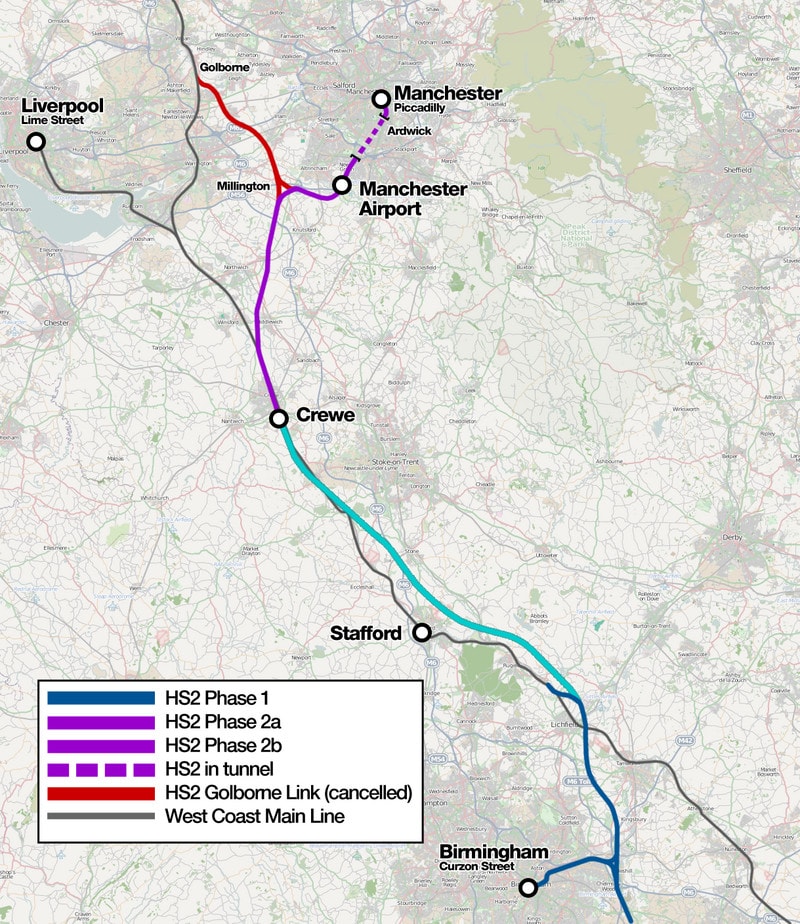Prime Minister Rishi Sunak has scrapped the HS2 rail project with the exception of the new London Euston to Birmingham line, which is already being built.
Speaking at the Conservative Party Conference, Sunak said: “HS2 is the ultimate example of the old consensus.
“The facts have changed, and the right thing to do when the facts change is to have the courage to change direction.”
Originally HS2 was due to run to Manchester.
 Former PM David Cameron lamented the move, saying “it will help to fuel the views of those who argue that we can no longer think or act for the long-term as a country; that we are heading in the wrong direction”.
Former PM David Cameron lamented the move, saying “it will help to fuel the views of those who argue that we can no longer think or act for the long-term as a country; that we are heading in the wrong direction”.
Richard Flenley, partner at law firm Charles Russell Speechlys, speculated on the impact of the prolonged uncertainty in areas where HS2 was due to happen.
He said: “The impact on homeowners and businesses whose properties have been threatened by potential acquisition cannot and must not be forgotten. If the Northern Leg does not proceed, will those adversely impacted to date be compensated?
“To learn that part of the scheme will now be cancelled – after years of property owners feeling stuck in a state of limbo – will leave many feeling that this has all been for nothing.
“Whatever decision is made about HS2’s future and the Levelling Up Agenda, the adverse impact of HS2 has already been felt – and for some, they now won’t see any benefits.
“This calls in to question how “fit for purpose” the law currently is at striking a fair balance between enabling major infrastructure projects and the interests of those business and homeowners who may (or may not) face compulsory acquisition of their properties at some point in the future”.
Jon Stott, group managing director of Ardent, a property and consents management practice, wondered if the UK could learn from its mistakes.
He said: “Aside from the macro factors, today’s decision is also a travesty for so many individuals and businesses and it raises huge questions about how we protect landowners and property owners whose land is earmarked to be acquired for major projects in the future.
“The statutory blight provisions are very narrow and mean that only owner-occupiers of property in certain circumstances can force the Government to acquire their land/property once it has been identified as potentially being required for a major scheme.
“HS2 introduced various discretionary hardship schemes that did help some additional people but still left many landowners and developers without any ability to sell their property, leaving them in a horrible state of limbo whilst their land has also been subject to safeguarding directions
“In addition to being unable to sell, the safeguarding directions have effectively precluded landowners from obtaining their own planning consent for any form of development. This has impacted huge swathes of land and thousands of landowners for over a decade.
“Sadly, I’m aware of multiple stories of people who have felt suicidal and who have suffered significant mental health issues as a consequence of the threat of being compulsorily purchased, and the uncertainty that has caused for them. Of course, it opens up bigger questions about the process on all schemes and lessons must be learned and acted upon.”
The construction industry is widely disappointed at the loss of such a major infrastructure project.
Tim Seal, head of construction at law firm Ridgemont, said: “Today’s decision removes a big piece of work for the construction industry and will be a source of disappointment and uncertainty for many businesses that were gearing up for Phase 2 of HS2. This is particularly the case for companies that have already landed contracts for Phase 2.
“They will need to scrutinise their agreements to see where they stand from a legal perspective. In particular what does the termination clause say about terminating the contract where the government shelves the project?
“It may well have been drafted to limit or exclude the contractor from having a right of recourse, which would make it difficult for affected businesses to dispute the termination of their HS2 contracts.”
Julian Worth, spokesperson for CILT Strategic Rail Policy Group, speculated on how costs have escalated on the project.
A budget of £55.7 billion for the whole of HS2 was set in 2015 but it was set to exceed £100 billion.
Worth sad: “The problem with HS2 is not that it is the wrong project, but that its costs have been allowed to escalate out of control. Some cost inflation was inevitable as a result of Putin’s invasion of Ukraine, but not to the extent which has occurred on HS2. Other densely populated countries are able to control the cost of major infrastructure projects and, within the UK, HS1 was delivered on time and under budget.
“A level of cost inflation has come about by changes to specification – particularly compared to the original proposals for a TGV-style line. Subsequent cost inflation suggests that something has gone badly wrong with the management of HS2 and we consider that a key factor was the failure to appoint and retain seasoned professionals, with knowledge of how to specify, tender and control major rail schemes, to senior roles in the project.
“CILT believes the correct course of action would have been to undertake a comprehensive review of HS2 costs by such seasoned professionals, using best practice from around the world, and considers the opportunity to do so should now be taken. Rather than a “bespoke UK” solution, consideration should be given to using specifications from existing schemes in Europe and beyond.
“The climate crisis is worsening by the year and the need to decarbonise is becoming greater and more urgent. Net Zero 2050 remains an imperative and government must not weaken long term commitments for short term expediency. Funding should not be diverted to high carbon road projects simply to satisfy the demands of a vocal minority.”







